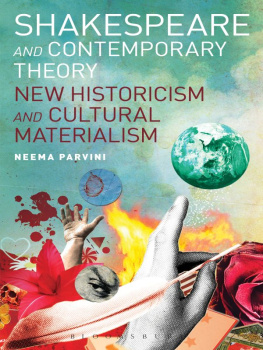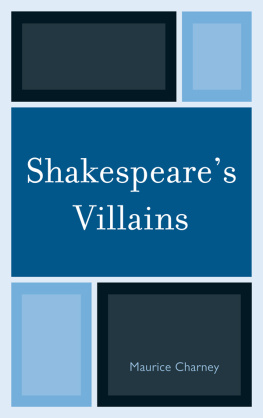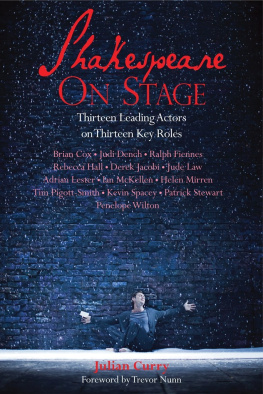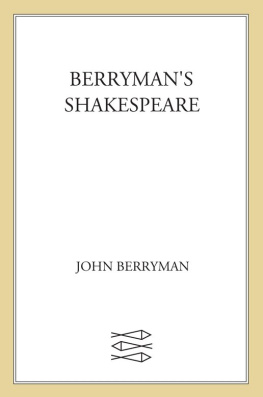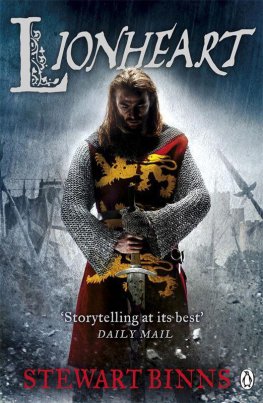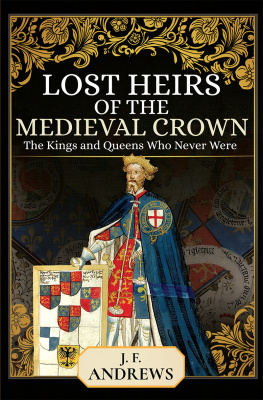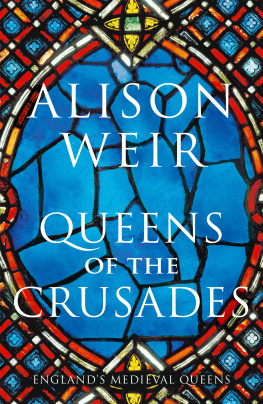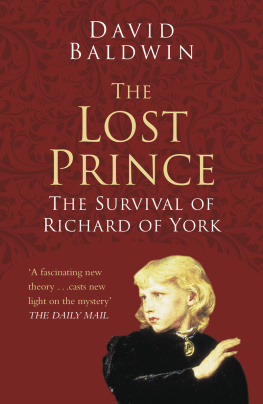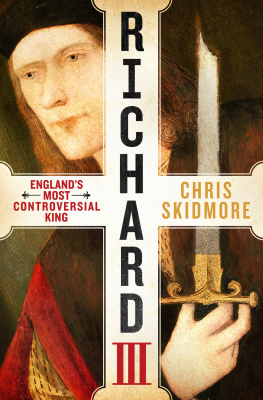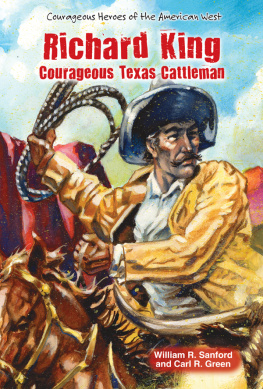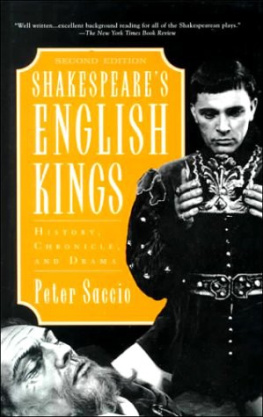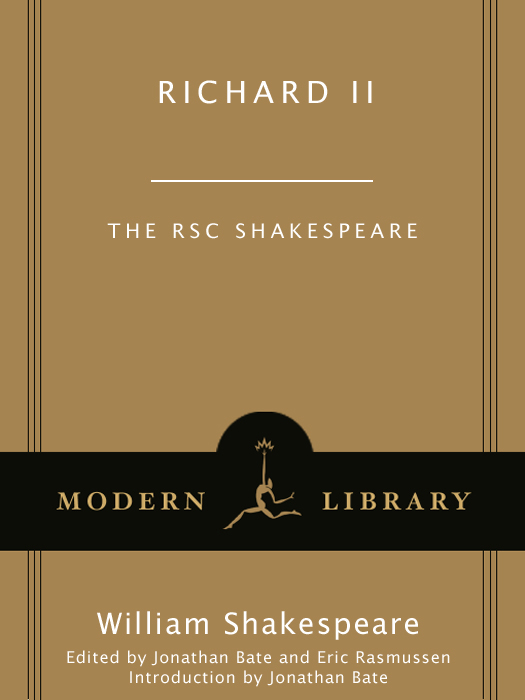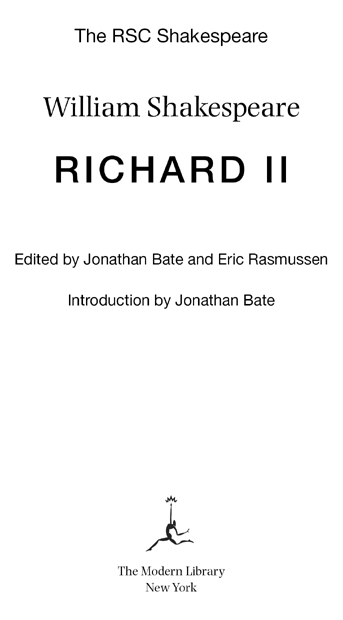2010 Modern Library Paperback Edition
Copyright 2007, 2010 by The Royal Shakespeare Company
All rights reserved.
Published in the United States by Modern Library, an imprint of The Random House Publishing Group, a division of Random House, Inc., New York.
M ODERN L IBRARY and the T ORCHBEARER Design are registered trademarks of Random House, Inc.
Royal Shakespeare Company, RSC, and the RSC logo are trademarks or registered trademarks of The Royal Shakespeare Company.
The version of Richard II and the corresponding footnotes that appear in this volume were originally published in William Shakespeare: Complete Works, edited by Jonathan Bate and Eric Rasmussen, published in 2007 by Modern Library, an imprint of The Random House Publishing Group, a division of Random House, Inc.
eISBN: 978-1-58836-877-5
www.modernlibrary.com
v3.1
The RSC Shakespeare
Edited by Jonathan Bate and Eric Rasmussen
Chief Associate Editors: Hlose Snchal and Jan Sewell
Associate Editors: Trey Jansen, Eleanor Lowe, Lucy Munro, Dee Anna Phares
Richard the Second
Textual Editing: Eric Rasmussen
Introduction and Shakespeares Career in the Theater: Jonathan Bate
Commentary: Ayako Kawanami and Hlose Snchal
Scene-by-Scene Analysis: Esme Miskimmin
In Performance: Maria Jones (RSC stagings), Peter Kirwan (overview)
The Directors Cut (interviews by Jonathan Bate and Kevin Wright):
Claus Peymann and Michael Boyd
Playing Richard: Fiona Shaw
Editorial Advisory Board
Gregory Doran, Chief Associate Director, Royal Shakespeare Company
Jim Davis, Professor of Theatre Studies, University of Warwick, UK
Charles Edelman, Senior Lecturer, Edith Cowan University, Western Australia
Lukas Erne, Professor of Modern English Literature, Universit de Genve, Switzerland
Akiko Kusunoki, Tokyo Womans Christian University, Japan
Jacqui OHanlon, Director of Education, Royal Shakespeare Company
Ron Rosenbaum, author and journalist, New York, USA
James Shapiro, Professor of English and Comparative Literature, Columbia University, USA
Tiffany Stern, Professor of English, University of Oxford, UK
CONTENTS
INTRODUCTION
LYRIC TRAGEDY
In the second act of The Life and Death of King Richard the Second, the queen weeps after her husband departs to fight a war in Ireland. She is comforted by Bushy, one of the kings courtiers:
Each substance of a grief hath twenty shadows,
Which shows like grief itself, but is not so.
For sorrows eye, glazd with blinding tears,
Divides one thing entire to many objects,
Like perspectives, which rightly gazed upon
Show nothing but confusion: eyed awry
Distinguish form. So your sweet majesty,
Looking awry upon your lords departure,
Find shapes of grief, more than himself to wail,
Which, looked on as it is, is naught but shadows
Of what it is not. Then, thrice-gracious queen,
More than your lords departure weep not. Mores not seen;
Or if it be, tis with false sorrows eye,
Which for things true weeps things imaginary.
Tears glaze the eyes and distort our vision, fragmenting what we see. The emotions are at odds with the work of reasoning. The substance of the queens griefRichard himselfis away in Ireland. What she holds in her head is a shadow, or rather many shadows, of him. When we are away from those we love, we fear that something bad may be happening to them. But the pictures of those bad things are not a reality: they are things imaginary.
Strong emotions and imagined images are themselves the substance not only of grief and foreboding, but also of fiction and theater. The Richard and the queen whom we witness on stage, or conjure into our minds in the act of reading, are shadows rather than substances. They are brought into being by performance, by the impersonation of roles, by playacting. When we think more deeply about the roles of king and queen in historical reality, we might consider this question of substance and shadow further. Which is the substance and which the shadow? The office or the man? The king in his capacity as embodiment of the nation and Gods representative upon earth assumes his role by means of costumes and props (robe, crown, scepter, orb, throne on which to sit) and of a highly theatrical ceremony (coronation, anointing, ritualized words, the blessing of the Church). Is there some sense in which that role is no more than a performance, in which a king is an actor-like shadow, whereas the true substance is the flesh-and-blood body of the mortal individual whose name is Richard? Or is it the other way around: does Richard become a mere shadow of himself when he loses the name of king?
These are some of the questions with which the Shakespeare of Richard II was fascinated. The play is the most static and inward-looking of his histories, and perhaps for that reason it has always been one of the less frequently staged. Yet its visual images are striking: a shattered mirror, a king stripped of everything and mired in a dark prison cell. And its verbal music is of startling beauty. The exploration of shadows and substances, selves and roles, public and private, is conducted in intensely lyrical, formal language. Bushys speech is typical. It proceeds in the form of a complex, balanced argument, rendered vivid by poetic imagery, such as the figure of the perspective glass, a kind of distorting mirror. And it is made memorable for both the actor learning the lines and the audience hearing the play by the resolution in rhyme at the close and by the beat of the iambic pentameter throughout. The pattern is of unstressed followed by stressed syllables five times over, with occasional reversals for variety and surprise. Find shpes of gref, mre than himslf to wil. The contrast between the shapes of grief and Richard himself is highlighted by the stress on more, which breaks up the regular rhythm that would lead us to expect a stress on than.
Richard II is the most poetic of Shakespeares history plays. The extreme formality of its rhetoric and verse forms perhaps represents the high point, and the end point, of his early style. Hereafter, his forms will become more fluid, less formal, more conversational. He will use less rhyme. Richard II is indeed a very rare example of Shakespeare writing a play entirely in verse. In the history plays he had written beforethe Henry VI sequence and Richard IIIand those he would go on to write soon afterthe two parts of Henry IV and Henry Vthe march of verse-speaking kings and courtiers is peppered with interruptions from the prose voices of the commoners. But in this play even the gardeners speak in polished and elaborate verse as they make an allegorical comparison between the overgrown garden and the kingdom run to seed.
THE ESSEX CONNECTION
The 1580s was a decade of war in Flanders, where the English fought with the Dutchmen against the might of Catholic Spain. The 1590s was a decade of war in Ireland, where the Earl of Essex struggled in vain to quell the rebellion of the irrepressible Hugh ONeill, Earl of Tyrone. For the first half of his career, all through the last years of old Queen Elizabeths reign, Shakespeare was a war poet. He had an obsessive interest in military life. Richard III, Titus Andronicus and all his sons, Othello, Iago and Cassio, Macbeth and the other Thanes, Hamlets armored father and young Fortinbras, King Lear, Julius Caesar, Brutus and Cassius, Mark Antony and Octavius Caesar, Coriolanus, Alcibiades, Henry IV and Sir John Falstaff, dozens of dukes, earls, and knights in the ranks of the history plays, Benedick and his colleagues in



